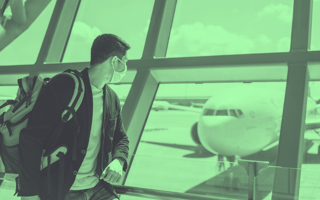Despite a year of restrictions, the desire to travel is still strong — albeit with a new emphasis on staying healthy and safe. Technology will stimulate travel in 2021, giving increased confidence about the safety of travel while delivering a better end-to-end experience.
Amadeus is one of the world’s largest travel technology companies, connecting more than 1.5 billion people to local providers in over 190 countries. Recently, we conducted a global study of more than 6,000 travelers. We found that 84 percent agree that technology will increase their confidence to travel in the next 12 months. Luckily, a lot of what travelers want from technology is already available.
Room to Move
There are two things that more than one-third of travelers surveyed want technology to do for them until vaccinations are wide-spread:
- Reduce queues and congestion in public spaces.
- Minimize face-to-face or physical contact with others in an effort to provide better protection against the spread of viruses.
The industry is already satisfying these demands in many travel hotspots, for example travelers have seen queue management and touchless technologies at theme parks and on cruise ships, and more recently at airports.
The momentum behind multi-function kiosks for check-ins and bag drops came from a desire to self-serve; today people are using that same tech at an accelerated rate as they seek to reduce contact with both surfaces and staff.
Airports and airlines have been incorporating touchless self-service at scale. Adding an ancillary sales channel to the check-in kiosk options and allowing touchless payment using a QR code both reduces contact and adds revenue for airlines.
Channel of Choice
Despite some isolated incidents during the early days of the pandemic-related disruption, the travel industry’s back-end systems efficiently handled the unprecedented volume of cancellations, refunds and rebookings. To give a sense of scope, Amadeus processed nearly 17 times the typical volume of re-accommodation transactions per day for our customers during that time.
The takeaway is that travel sellers need to be able to connect with customers using their channel of choice in real time — with options to service the trip across all channels and devices.
Of course, travel disruptions weren’t born just in the age of COVID-19. Dealing with changes has long been an established passenger pain point. But technology’s role in addressing this customer service issue has taken center stage as the effects of travel restrictions became more prevalent during COVID-19.
As a result, flexible solutions such as chatbots were quickly implemented to assist passengers with their most common questions to reduce hold times or even reduce the necessity to contact call centers at all by allowing easier self-service. This also helped airlines as passengers considered vouchers for future travel use rather than a refund — which benefits both the traveler in knowing they have funds set aside for travel and the airline in retaining cash reserves.
Introducing the next level of self-service is part of an airline’s toolkit for restoring passenger confidence and giving them a feeling of control and flexibility.
Fit to Fly
Pre-COVID, travelers opted in to share personal information if they got something in return, such as a better seat, an upgrade, bonus points and more. Thinking ahead, travelers in many cases may now have to share information about test results and vaccinations to be allowed to board a flight. Travelers expect their travel seller to be involved in the bigger-picture health aspects of a trip: 28 percent think the industry has a role to play in ensuring the accuracy and effectiveness of national test, track and trace programs.
Work is under way to create a digitally verifiable safe travel ecosystem. This is prompting airlines, airports and tech suppliers to work with regional and national governments and public and private sector testing labs and vaccination hubs.
IATA’s Travel Pass is a solution to validate and authenticate all country regulations regarding COVID-19 passenger travel requirements. CommonPass is another health aggregator supported by the World Economic Forum for their travel and transportation partners including airlines and airports. Also, AOKpass, a risk mitigation tool from the International Chamber of Commerce, enables governments and border authorities to reopen travel across borders safely and efficiently. Elsewhere, enterprise tech giants including Microsoft, Salesforce and Oracle are working on standardizing information for a consumer-facing app. While there are efforts to arrive at a common global approach, it is inevitable that there will be many standards to bring together as the travel industry and governments strive to find effective alternatives to quarantines and travel restrictions to create a safe travel environment.
But this should play right into travel tech’s ballpark. The ability to aggregate fragmented content from different sources into a single, coherent, constantly updated and secure trusted data source is within reach. This can be verified and pulled into airline systems and pushed out to travelers while allowing for data privacy. Integration is key as digital solutions may have applications beyond checking in for a flight. Sports events, music festivals and global trade shows are all potential use cases.
Travelers never lost the desire to travel, even during the darkest days of the pandemic. Today, as travel slowly reopens, it’s encouraging to see the travel, technology and healthcare industries working together to optimize and authenticate processes where they have control so that travelers feel confident again. Traveler confidence will be made up of many moving parts, and scalable, adaptable, integrated technology connects them all.





